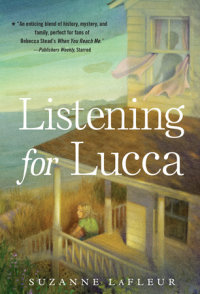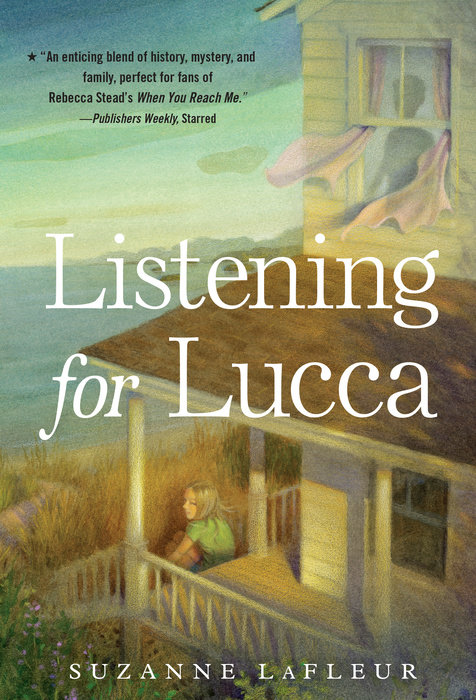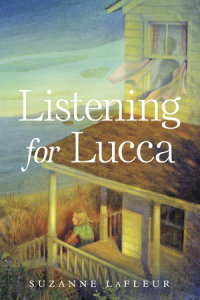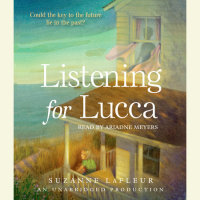Listening for Lucca
Author Suzanne LaFleur
"I'm obsessed with abandoned things." Siena's obsession began a year and a half ago, around the time her two-year-old brother Lucca stopped talking. Now Mom and Dad are moving the family from Brooklyn to Maine hoping that it will mean a whole new start for Lucca and Siena. She soon realizes that their wonderful old house on the beach holds secrets. When Siena writes in her diary with an old pen she found in her closet, the pen writes its own story, of Sarah and Joshua, a brother and sister who lived in the same house during World War II. As the two stories unfold, amazing parallels begin to appear, and Siena senses that Sarah and Joshua's story might contain the key to unlocking Lucca's voice.
An Excerpt fromListening for Lucca
1
I'm obsessed with abandoned things.
Left-behind things, unwanted things. Forgotten things.
When Lucca and I got to the park, a small lamb waited on a bench.
The lambie was stuffed and half-full of plastic beans and fluff. He was gray and worn; chew marks creased his nose. He was small enough to hold in one hand.
No sign of the lamb's owner. There was only one other person at the park. He wore a top hat and formal jacket, very hot clothes for sweltering July. He was reading the paper, and every once in a while he took out a pocket watch to check the time. I could see him only out of the corner of my eye; I didn't want to be caught glancing his way. I wasn't sure if he was really there, but people dress in all kinds of funny ways around here, so I tried to tell myself he was just someone in old-fashioned clothes. Not something else.
Because from time to time, I get these glimpses of things, almost like . . .
The lamb,…
1
I'm obsessed with abandoned things.
Left-behind things, unwanted things. Forgotten things.
When Lucca and I got to the park, a small lamb waited on a bench.
The lambie was stuffed and half-full of plastic beans and fluff. He was gray and worn; chew marks creased his nose. He was small enough to hold in one hand.
No sign of the lamb's owner. There was only one other person at the park. He wore a top hat and formal jacket, very hot clothes for sweltering July. He was reading the paper, and every once in a while he took out a pocket watch to check the time. I could see him only out of the corner of my eye; I didn't want to be caught glancing his way. I wasn't sure if he was really there, but people dress in all kinds of funny ways around here, so I tried to tell myself he was just someone in old-fashioned clothes. Not something else.
Because from time to time, I get these glimpses of things, almost like . . .
The lamb, I reminded myself. I sat down beside it and waited. I'd let Lucca play for half an hour; if no one came for the lamb by then, I would take it home.
That was always the gamble. What if someone came back and their special thing was gone?
But I always think: they forgot. The lamb could sit there, fade in the sun and rot in the rain. It might take the owner ages to remember that he'd even had a lamb. Then it would be too late and all a waste.
My collection of rescued things drives Mom crazy. I started it about a year and a half ago, sometime after Lucca stopped talking. Mom used to tell me not to bring home junk I'd found, but I insisted that these carefully selected items weren't junk, though I couldn't explain it any better than that. I cleaned them and set them neatly on my shelf and made sure dust didn't gather on them. How was it that they had come to be lost?
Sometimes things need rescuing.
Mom seemed to be hoping that when we moved I wouldn't take my collection with me. She'd limited the number of boxes I could use, thinking I might pick other things instead, but it was actually the first thing I packed.
"Siena, what if you don't have room for the important things now?"
"This is an important thing. I'll leave behind my winter clothes if I have to."
Mom had let out an exasperated sigh. Moving to our own house on the New England coast would not be the time to leave winter clothes behind. I knew that would push her buttons.
I also knew what Dad had told me, which was that the moving truck would be huge. So Mom was full of it. We could bring everything we wanted. Dad had said so.
I watched Lucca climb up the green-painted bars and zip down the slide. He made some kind of low superhero noises and zoomed around the climbing structure on foot. "Whoosh, shwoosh, whoosh."
This time was the last Lucca would play here. I'd played in this park every day when I was little, too. It hadn't changed, except for the color of the painted bars, from orange to beige and green. I knew every corner, from the cozy hiding spot under the slide to where to turn on the sprinklers in the summer. I was tempted to go for one final climb-and-slide myself, but I stayed put, watching. Lucca didn't mind playing alone. Maybe he even preferred it.
I kept track of the half hour on my watch.
"Come on, Lucca. It's time to go home."
The word home hung in the air, as if testing itself.
I scooped up the lamb. Lucca pointed, asking about it.
"It's dirty," I explained. "We can't play with it."
When I didn't hand it over, he shrugged and took my other hand. We walked back to our apartment.
In my room, I found the box with the other collected items in it. A pocket watch with a broken face. A Brooklyn library card that said Hannah Stone in little-kid writing. A shovel-and-bucket pair from the beach. Three unmatched earrings. A participation ribbon for an unknown event. A silver spoon, except it probably wasn't real silver, because it didn't tarnish. And a hundred other things. I dropped in the lamb and folded the cardboard flaps back down.
I looked at my life, packed up in a dozen boxes. My life, and all these little pieces of other lives. I was their protector. They wouldn't be left behind again.
Our apartment would become an abandoned thing. One too big to collect.
The movers were coming in the morning.
The upstairs hallway has the glow of daylight but no direct sunshine. The ocean breeze blows in through the open windows of the four bedrooms. I put my hand on the banister and follow the railing to the stairs and then down. At the bottom, I look right and left into living rooms on either side and step through the grand front doorway onto a painted wooden porch. From there I can see the ocean. Everything's calm and beautiful, but the breeze chills my arms and makes the hair on them stand up.
I awoke, still in my bed in Brooklyn.
Back around the time Lucca had stopped talking and I'd started collecting, I'd also started dreaming about this house, this big old house by the sea.
Today we were going there.
Mom was arguing with Lucca over sealing up his toys in boxes.
"But that's how they'll ride in the truck to our new house," she said. Then, "But we have to close them in so they stay nice and safe. We have to shut the boxes!"
Arguing between them is Mom getting louder and louder, and Lucca not saying anything but using his body to show what he wants. I didn't go into the tiny office that we'd converted into his bedroom, but from Mom's shouts of "Lucca, get up! Get off!" I pictured him slung across the boxes. I guess I wasn't the only one trying Mom's patience during the packing process.
I got dressed, grabbed my notebook and music, and yelled to Mom that I was going.
We'd made this deal: I didn't want to see our apartment empty and abandoned, and Mom wanted as few people as possible underfoot, so she told me I could sit in the coffee shop on the corner until it was time to go.
"Bye!" I yelled.
"Wait!" She hurried after me. "Here's a twenty. And take your brother!"
I hadn't expected that. But Lucca's tiny sneakers pounded to catch up, and soon his hand was in mine.
At the coffee shop, I set up Lucca at a table by the window. It was so early no one else was sitting down yet, just getting coffees to go. I bought juice and a muffin for me and a slice of some kind of loaf cake and a yogurt for Lucca. He ate happily for a long time while I wrote and listened to my music. Eventually he finished eating, so I tore pages out of my notebook and showed him how to fold the paper into little dogs and then draw their faces. His little figures hardly resembled dogs, but he lined them up so they could see out the window. He tapped the glass for me to look--the little paper pups were watching the real dogs outside going for their morning walks.
Later, there came another tap on the window. It was Dad, outside. Time to go.
Bye, Brooklyn.
2
"Are you excited, Siena?" Mom asked. I could see her hopeful eyes trying to catch mine in the rearview mirror.
"I guess so." I turned to look out the window. We'd be out of the city soon.
Lucca sat next to me, playing with action figures on the edge of his booster seat. Mom took the opportunity to blast kiddy tunes and sing along really loud, trying to get him to open up and sing along, too. But as usual, even though he kicked his feet to the music, he was silent. And the kiddy tunes were annoying. I put my headphones back on to drown them out.
I wasn't sad about leaving Brooklyn. I'd liked my elementary school okay, but not the past two years of middle school. The kids seemed rough and swore all the time, as if it made you cool. But I knew that swearing all the time means you really don't know when to use those words. Like when your English teacher assigns homework. That's not really a time to swear at her. Isn't giving homework what teachers are supposed to do? I never really got along with those kids to begin with, and then things got a little bit worse. Basically, I turned into a big weirdo. Much weirder than kids who moan and groan about homework.
But it was unlikely I'd be any less of a weirdo in Maine.
Mom seemed to be hoping this move would be good for me; in fact, it was one of the reasons we were going. She'd always worried that I didn't have many friends, but when I stopped having Kelsey over for sleepovers, she'd obviously noticed that my having just a best friend had changed to having no friends at all.
"We're moving to your house," she reminded me. "The one from your dream."
I'd told Dad about my recurring dream because he likes to talk about that kind of stuff. He'd included Mom in the conversation. I'd told them about the house's rooms, its layout, its large front door, its porch overlooking the ocean. Mom had said, "As long as this dream isn't scary, we probably don't need to worry." Worry? That was a strange thing to say. Dad and I hadn't been worried.
I kept having the dream but didn't talk about it much anymore. But I guess they both remembered. When Mom and Dad went to house-hunt this past spring, Mom called me at Grandma's to tell me she'd found "my" house.
"It's just like it!" she'd said on the phone that night. "It's amazing! I have a really good feeling about it. Dad and I are putting in an offer. Can I talk to Lucca?"
Putting Lucca on the phone is the world's biggest waste of time, so I'd said, "Sure, oh, here he is." I held the phone up into the air and listened to Mom mumble incoherently like Charlie Brown's mom until she stopped and then I hung up.
"Siena . . ."
A hand was shaking my knee. My mother was turned around in the front passenger seat, trying to wake me up.
I stretched, stiff from the hours of sitting in the car. I took off my headphones and looked around.
"We're here, sleepy. I didn't want you to miss it."
How could I miss it? Sooner or later I'd see the house for the first time. But I decided not to point that out--Mom says I make too many comments sometimes--and got out of the car.
It did look like the house I'd dreamed: big, wonderful, an old Victorian near the ocean. I walked across the front lawn, my feet knowing exactly where they liked to fall already. It was eerily like coming home, even though I hadn't been here before.
"It's a bit run-down." Dad followed me, watching me look at the house. He seemed almost nervous, maybe wondering if I'd like it. "But with some fixing up it'll be totally awesome."
I thought it was totally awesome already, but I wasn't about to tell my parents that. I ran my hand along the banister of the porch steps, peeling paint sticking to my hand. It was gray-blue, but for some reason, I felt like it was supposed to be white. Like I remembered it being white. Maybe it was just hard to see the colors, in the dream.
Lucca tromped up the steps behind me, carefully holding on to the railing.
"Come on, buddy, let's explore."
Lucca and I ran all over the downstairs--four rooms and a bathroom with no tub--and all over the upstairs--also four rooms plus a full bathroom that was ten times the size of our old one.
My memories of the house I'd dreamed felt hazy, and I couldn't tell if the layout was exactly the same.
But it did seem similar, I was sure of that. I hoped it was a good thing. Maybe I'd dreamed it because it would be a good place for us. Because we were meant to be here.
I followed Lucca out onto the porch to look at the water and remembered the next part of the dream, because it happened then, too: the feeling of goose bumps rising on my arms. I tried to shake them away. It was warm out, after all.
Dad was carrying things in from the car.
"You always said we couldn't afford a big house." Something I had always wanted.
"In Brooklyn we couldn't. Plus we got a good deal on this one since it needs so much work. Why don't you head upstairs and find your bedroom? Yours is the one with the window seat. Mom and I thought you'd like to read there."
I ran back upstairs to look again. The room with the window seat was nice. Way bigger than my old room. I stood and looked out the window for a few minutes. I could see the ocean, though I couldn't hear it. And there were grass and trees between here and the water. Grass! And trees! My own grass and trees!
As I leaned on the window seat, staring out at the water, a cool breeze grazed my neck from behind. I rubbed it. Then it felt less like a breeze and more like that sense of someone watching you when you aren't expecting it.
I turned around. I seemed to be alone in my room. There was no furniture yet to hide behind, so where would someone be? Even the closet was open and empty.
I jumped about a mile when Lucca showed up behind me.
"Whoa! Hi, buddy," I said. "Do you like our new house?"
The doctor said it's important to keep asking him questions, even if we don't think he's going to answer. One day, he might.
Lucca nodded.
"Good," I said.
I should have asked, "How do you like our new house?" but then I probably would have gotten no answer at all.
After unpacking the car, Dad drove (drove!) to the grocery store. In Brooklyn I'd always had to help carry groceries home on foot. Dad came back with about ten bags of groceries to get us started. I unloaded everything into the fridge or the pantry, while Mom dug through the boxes the movers were bringing into the kitchen.



